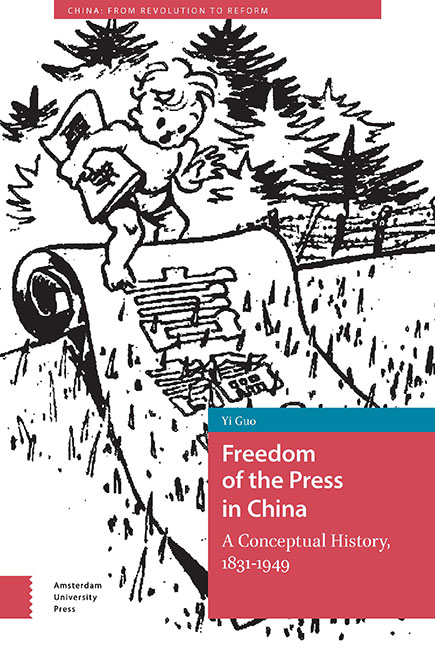Book contents
- Frontmater
- Contents
- A Note on Romanization
- Acknowledgements
- Foreword
- Introduction
- 1 The Enlightenment of the West
- 2 Chuban Ziyou: The Invention of a Neologism
- 3 The Liminal Landscape
- 4 The Intellectual Legacy of Sun Yat-sen
- 5 The Empty Phrase and Popular Ignorance
- 6 Conceptual Debates in the 1920s and 1930s
- 7 The Last Call for Press Freedom
- Conclusion
- Bibliography
- Index
- Frontmater
- Contents
- A Note on Romanization
- Acknowledgements
- Foreword
- Introduction
- 1 The Enlightenment of the West
- 2 Chuban Ziyou: The Invention of a Neologism
- 3 The Liminal Landscape
- 4 The Intellectual Legacy of Sun Yat-sen
- 5 The Empty Phrase and Popular Ignorance
- 6 Conceptual Debates in the 1920s and 1930s
- 7 The Last Call for Press Freedom
- Conclusion
- Bibliography
- Index
Summary
Abstract
This chapter explores the reception of the Western concept of press freedom by Chinese intellectuals when they first encountered it at the turn of the twentieth century. It argues that, during this process of knowledge transfer, the meaning of press freedom as received by Chinese intellectuals was different from Western conceptions at that time. It shows how the introduction of this concept was closely related to the developing realities of Chinese society and echoed Chinese social and cultural pursuits in the late nineteenth century. Due to their specific socio-cultural milieu, Chinese intellectuals misinterpreted the moral discourse and liberal meanings of the Western concept of freedom of the press.
Keywords: nationalism, Confucianism, imperial bulletin, censorial system, cross-cultural interpretations, civil rights
The previous chapter concluded that when the nineteenth-century pioneers initially introduced the Western idea of press freedom into China, they outlined three fundamental principles as to why it should be adopted. First, that the ‘state’ would benefit from a free press, as the better a free press performs its function, the more prosperous the country will become. Second, they saw freedom (including freedom of the press and freedom of speech) as endowed by natural law and by God (or ‘Heaven’ in Chinese parlance). Freedom of speech as a natural right was understood to be God's gift to mankind. Therefore, people should be allowed to express their opinions freely and to publish their thoughts in books, pamphlets, and periodicals without censorship. Protestant missionaries maintained that all people should be allowed to express and publish their opinions without government interference, and press freedom was articulated as an indispensable constituent of the discourse of freedom of religion (particularly the freedom of publishing articles to disseminate the doctrines of Christianity). They also maintained that the freedom of the press was a civil right that enabled citizens to monitor the government and to express their political opinions. Third, the early pioneers argued that since press freedom derived from freedom of thought, freedom of the press must be fully respected so that each individual might be allowed to think freely.
- Type
- Chapter
- Information
- Freedom of the Press in ChinaA Conceptual History, 1831–1949, pp. 87 - 116Publisher: Amsterdam University PressPrint publication year: 2020



